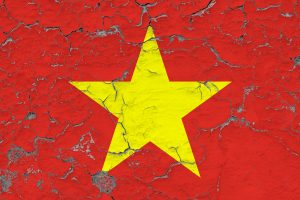Vietnam’s foreign minister could be disciplined for a wide-ranging corruption scandal involving government-organized COVID-19 repatriation flights, which has seen a spate of arrests, reprimands, and expulsions from the ruling communist party.
The Central Inspection Committee of the Vietnamese Communist Party (VCP) recommended yesterday that the Politburo and the Party Central Committee Secretariat discipline the entire foreign ministry for the scandal, up to and including Minister Bui Thanh Son.
The so-called COVID-19 repatriation flight scandal involved officials extracting extortionate fees during the organization of around 400 repatriation flights for Vietnamese citizens stranded abroad during the COVID-19 pandemic. The Ministry of Public Security said in June that each repatriation flight earned profits of several billion Vietnamese dong, which was subsequently divvied up by corrupt officials. For comparison, 1 billion dong is worth around $43,600.
The recommendations from the Central Inspection Committee, which is in charge of the VCP’s internal discipline, came as Hanoi’s deputy chairman Chu Xuan Dung was arrested for involvement in the grift, along with Vu Hong Nam, a former ambassador to Japan. So far, more than 35 people from multiple ministries have been arrested, including high-ranking officials like former Deputy Minister of Foreign Affairs To Anh Dung.
This has come amid a wider purge of the Foreign Ministry. This week, consular officials posted to embassies in Russia, Malaysia, and Angola, including Nguyen Hong Ha, the consul general in Osaka, Japan, were sacked and expelled from the VCP. Other officials, including the current ambassador to Malaysia, the former ambassador to India, and the consul general in Fukuoka, Japan, were reprimanded.
The ramifying scandal, which has believed to have generated an estimated $200 million in illicit income for those involved, highlights once again the severe problems with corruption in Vietnam. The COVID-19 pandemic in particular has been a bonanza for the extraction of bribes by Vietnamese officialdom. Earlier this year, the VCP expelled several officials for involvement in a scandal involving the procurement of overpriced COVID-19 test kits. The scheme netted an estimated $172 million for those involved.
The scandals have persisted despite the years-long anti-graft campaign waged by VCP General Secretary Nguyen Phu Trong. Known as “burning furnace” (dot lo), the campaign saw more than 11,700 cases of economic crime brought to trial by the end of 2020, according to the government’s own figures. This included 1,900 corruption cases involving 1,400 suspects, including one sitting member of the Politburo, seven former and current members of the central committee, four former and current ministers, and seven military and police generals.
Yet despite this high-profile campaign, large-scale and seemingly well-organized corruption scandals continue to flourish under the umbrella of the Vietnamese party-state. This seems to point to structural causes, rather than simply the moral character of Vietnamese officialdom, as Karie Nguyen wrote in The Vietnamese last year.
“In Vietnam, corruption has gradually become universally accepted into the system,” she wrote. “This means that the decision to commit an act of corruption no longer depends on the rationality or morality of an individual. It has become an instinct of those who participate in the system.”
































